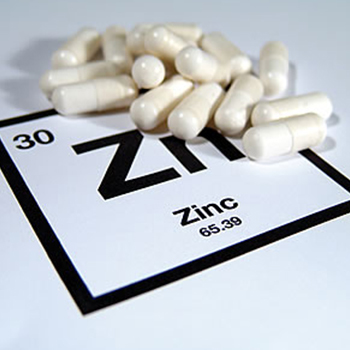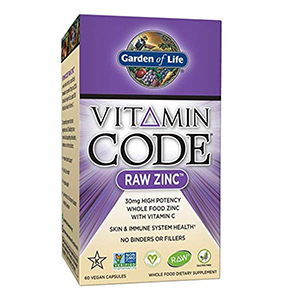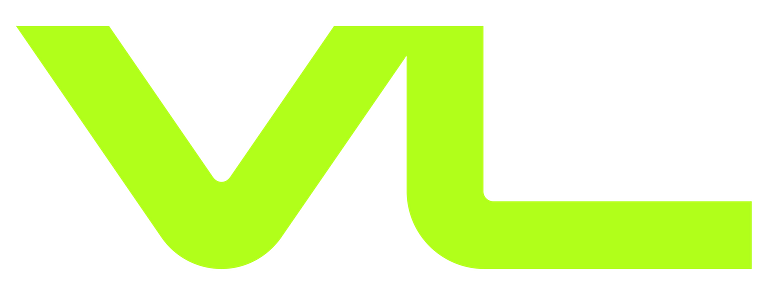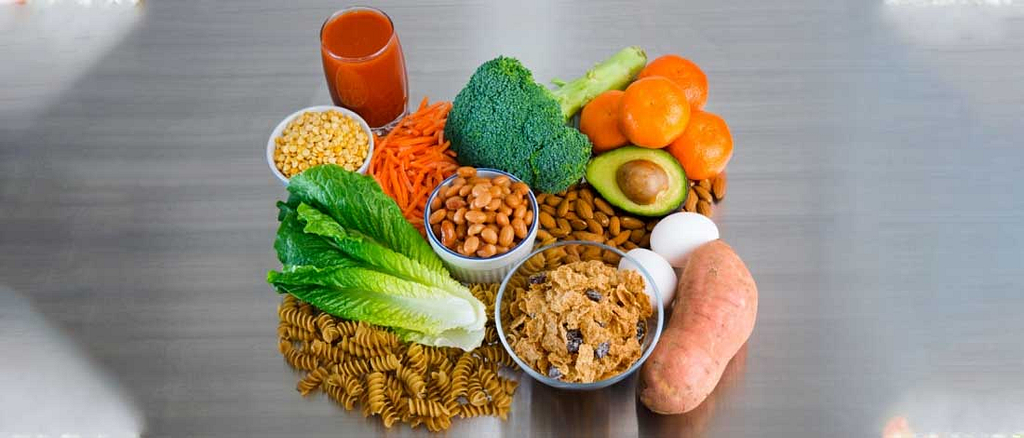As a fellow vegan, this will probably sound familiar to you. You mention to someone that you keep to a strict plant based diet, and you’re immediately bombarded with questions.
Is your blood count low because of a lack of iron?
Have you had a lot of fractures because you don’t have enough calcium in your meal plans?
But how often does someone ask you about zinc intake?
Probably not that often, and yet this vital mineral is something that vegans need to pay more attention to than people on vegetarian diets.
Let’s first find out why zinc is important.
Why Is Zinc So Important?
Of all the nutritional minerals that your body needs, zinc is possibly one that has the most wide-ranging impact on different functions.
Everything from immune function to wound healing, as well as hormone production and protein synthesis are highly dependent on healthy zinc levels.
And one of the problems with zinc is that the human body cannot store it like fat or protein (see also ‘How Much Protein Can the Body Absorb?’). You need a steady supply every single day, ideally in the foods that you eat (see Japanese Food). As a guide, you should aim for 8 mg daily for women, and 11 mg for men.
Vegetarians and omnivores generally find it easy to get the right amounts of zinc from dairy and meat products, but on a vegan diet, it can be a little bit more tricky. The reason is that zinc is not as abundant in most non-animal products.

When I was a newcomer to veganism, I focused a lot on vitamins and iron, but unless my dietitian had pointed it out, I could have started showing signs of deficiencies.
First, though, let’s take a look at why vegan dieters can become zinc deficient.
Are Vegans More Likely To Be Zinc Deficient?
Yes, vegans are more likely to be zinc deficient than vegetarians or omnivores. The main reason is that the zinc content in vegetables is a lot lower than in meat and dairy products like milk and cheese.
But just because you’re eating a plant-based food diet doesn’t mean that you don’t have some good options.
The main reason for a deficiency is that vegan newcomers focus on iron and B12 vitamin requirements, not knowing that their zinc intakes are just as important.
If you have some concerns that your meal plan isn’t providing enough zinc, then it’s important to first look for some symptoms.
What Are The Signs Of A Zinc Deficiency?
The main signs of zinc deficiency can be wide ranging, including impaired immune function, unexplained weight loss, mental lethargy, loss of appetite, impotence, hair loss, and problems with minor wound healing.
You may not experience any of these for quite a while, and they can go unnoticed, especially if you have a stressful life.
In severe cases, this will require medical attention, but with some simple adjustments to your food intakes, you can easily balance your need for critical nutrients.
10 Sources Of Vegan Friendly Zinc

As mentioned, most plant foods like fruits and salad are not a great source of zinc. But you don’t have to immediately jump into supplement mode, as there are 10 excellent ways to adjust your food.
Nuts and seeds are among the best options, but beans and fortified food should not be ignored, especially since they can be easily added in larger volumes.
Let’s take a closer look.
- 1Hemp Seeds – By far the most potent and increasingly available vegan zinc source is hemp seeds, which are quickly becoming the new superfood. You can easily add half a cup of them to your breakfast or salad to get half your days’ dietary zinc need covered.This nutrient-rich food is also a good source of fiber and protein.
- 2Tahini – A close second is Tahini, which I must say is a bit of an acquired taste. Made from sesame seeds, this concentrated paste is a bit bitter, but a serving of just a few spoonfuls will provide a potent amount of zinc. Just avoid trying it out on children, as the taste can really turn them off.
- 3SesameSeeds – There are absolutely no shortages of recipes to include sesame seeds in. Whether it’s in your oatmeal breakfast, lunchtime salad, or a tasty dessert or snack, it’s a big favorite in the vegan community because of that flexibility.
- 4Soybeans – From a nutrition perspective, soybeans are just a perfect option, especially if you do a lot of exercise. It’s known as being one of the better plant sources of protein, but will also deliver a good dose of zinc. Just 1 cup will deliver half the daily need for an adult.
- 5Lentils – Some of my favorite soups and curries include lentils, and while they are full of good carbs and protein, their zinc content is pretty impressive too. I would regularly have two cups of lentils in a meal, and that delivers plenty of raw energy and my daily zinc needs.
- 6PumpkinSeeds – Pumpkin seeds don’t have as much value from a nutrition perspective when it comes to zinc compared to the other above options, but they are tasty and easy to add to salads and cooked meals as well.
- 7Cashews – These are my absolute favorite nuts, and I tend to buy them in large bags at my local health food store. You read a lot of negative things about the production of these nuts, but if you get organic and sustainably grown ones, then it’s a great option for a zinc boost.
- 8FortifiedCereals – Grains and cereals (see also ‘Is Reese’s Puffs Cereal Vegan or Dairy-Free?‘) themselves are generally not food sources with the best zinc status. But you can get a lot of breakfast cereals (see also ‘Are Cheerios Vegan?’) that are fortified with zinc, copper, calcium, and vitamin B12.
- 9Quinoa – Quinoa is another option that isn’t as packed full of zinc as other vegan products listed above, but it’s so easy to add several cups into a single meal recipe. I actually prefer using it to rice these days, as it’s low in carbs and calories.
- 10Tofu – I know I’m breaking with an unwritten rule that any vegan food list has to feature Tofu at the top. But, I like to be a rebel, and it’s not really a favorite of mine. However, it is a great vegan food source for zinc and protein, so certainly should not be avoided.
|
Legumes |
Zinc (mg/100g) |
|---|---|
|
Soy Beans |
5 mg |
|
Lentils |
5 mg |
|
White Beans |
4 mg |
|
4 mg |
|
|
Chickpeas |
3 mg |
|
Nuts And Seeds |
Zinc (mg/100g) |
|---|---|
|
Hemp Seeds |
11 mg |
|
Tahini |
10 mg |
|
Pumpkin Seeds |
6 mg |
|
Cashews |
5 mg |
|
Sunflower seeds |
5 mg |
How Can You Enhance Your Absorption Of Zinc?
Many vegan dieters can struggle with zinc absorption, even if they include plenty of zinc-rich food on a daily basis. If you have planned your own recipes and nutrition intakes carefully, and are still showing some of the above symptoms, then it could be down to a problem with bioavailability.
What this means is that even if food is ideal from a zinc point of view, it could also contain a lot of phytates. Also known as phytic acid, it has a tendency to bind to metals like zinc [1].
This bond can be very difficult to break up in your stomach, meaning that a lot of the zinc will just pass right through you.
Most common cooking processes will break down that bond, which is why this is most commonly a problem for raw vegans (see also ‘6 Easy Raw Vegan Meals For Bodybuilding‘).
The inhibitory effects of phytate on absorption of zinc can be minimized by modern food-processing methods such as soaking, heating, sprouting, fermenting, and leavening.
The Medical Journal Of Australia
Suitable Supplements
If you’re a raw vegan (see also ‘80/10/10/Diet: Meal Plan, Risks & Benefits‘) or just struggling with intakes of minerals during your initial switch to vegan life, then supplements are something you should consider. It can also be a struggle if you plan longer fasting (see also ‘What is Fasted Training and Who Should Use It?‘) periods where you’re taking in less nutrition.
Fortunately, there are some excellent vegan mineral supplements and even some whole green powders.
I would generally say that if you have any of the above-mentioned symptoms that you get a blood test done to check for any deficiencies.
If zinc shows up low then get a fast boost with supplements, and then start adjusting your food recipes.

Other Resources You May Like:
- Best Vegan Protein Sources
- Best Vegan Sources of Calcium
- Best Spirulina Supplement
- Best Vegan Digestive Enzymes
- Expert Roundup – Daily Nutrition Guide For Vegans
FAQ

Should Vegans take zinc?
Yes, vegans should consider taking zinc supplements on a regular basis. It doesn’t have to be every day if you have managed to adapt your recipes for some added zinc, but it’s still a good idea to get a small boost every few days.
What is the best form of zinc to take?
Zinc picolinate is the best form of zinc to take as it is the easiest for your digestive system to absorb. If you do have deficiency symptoms, then this is the best option, even if it will cost a bit more.
Do Almonds contain zinc?
Yes, almonds contain zinc, but they are not as concentrated from a nutrition point of view as cashew nuts are. I also find cashews easier to add to recipes to create some really tasty meals.
Does zinc help you sleep?
Yes, zinc can help you sleep better as it plays a key role in hormone production, including melatonin. With a generally more balanced hormone level and a small boost of melatonin, you can achieve a more restful sleep.
Final Thoughts
With the above 10 sources of zinc, you should have some excellent options to improve your overall balance of nutrition and get that much needed extra zinc. It can be very easy to pay too little attention to this mineral, especially when you are first switching to veganism.
You can also supplement this with multivitamin supplements for vegans that contains zinc.
If you’ve had some personal experience with supplements, or you found some clever ways to adjust your nutrition, then please feel free to send us a message on social media or by email.
[tcb-script type=”application/ld+json”]{“@context”: “http://schema.org/”,”mainEntityOfPage”: “https://veganliftz.com/zinc-vegan-diet/”,”@type”: “Article”,”headline”: “10 Best Zinc Food Sources for Vegans – Level up Your Nutrition”,”datePublished”: “2018-08-16″,”dateModified”: “2019-11-05″,”description”: “Interested in learning all about zinc on a vegan diet? Then I’d highly suggest you to read this article. You see, the mineral zinc is a essential to our survival and health, and has this secret…”,”keywords”: [“foods high in zinc vegan”, “vegan sources of zinc”, “vegan foods high in zinc”, “zinc foods vegan”, “zinc rich foods vegan”, “zinc vegan diet”],”image”: {“@type”: “ImageObject”,”height”: “379”,”width”: “725”,”url”: “https://veganliftz.com/wp-content/uploads/2017/11/zinc-and-vegan-diet-1024×536.jpg?x12904″},”author”: “Jason Hughes”,”publisher”: {“@type”: “Organization”,”name”: “Vegan Liftz”,”sameAs”:[“https://www.facebook.com/veganliftz/”,”https://twitter.com/veganliftz/”,”https://www.pinterest.com/veganliftzofficial/”,”https://www.instagram.com/veganliftz/”,”https://www.youtube.com/channel/UCVilJCjZsaI1Q50fbM_IsnQ”,”https://goo.gl/maps/sC3u4cuyWLqYwhBY7″],”logo”: {“@type”: “ImageObject”,”url”: “https://mlbmbvodvbvn.i.optimole.com/w:auto/h:auto/q:100/f:best/https://veganliftz.com/wp-content/uploads/2019/04/Veganliftz_White_Small.png”}}}[/tcb-script]
References:
1. Office of Dietary Supplements – Zinc. (n.d.). Retrieved from https://ods.od.nih.gov/factsheets/Zinc-HealthProfessional/2. Lönnerdal, B. (2000, May). Dietary factors influencing zinc absorption. Retrieved from https://www.ncbi.nlm.nih.gov/pubmed/108019473. Hunt, J. R., Matthys, L. A., & Johnson, L. K. (1998, March). Zinc absorption, mineral balance, and blood lipids in women consuming controlled lactoovovegetarian and omnivorous diets for 8 wk. Retrieved from https://www.ncbi.nlm.nih.gov/pubmed/9497185?dopt=Abstract4. Armah, S. M., Boy, E., Chen, D., Candal, P., & Reddy, M. B. (2015, August). Regular Consumption of a High-Phytate Diet Reduces the Inhibitory Effect of Phytate on Nonheme-Iron Absorption in Women with Suboptimal Iron Stores. Retrieved from https://www.ncbi.nlm.nih.gov/pubmed/260416775. King, J. C. (2011, August). Zinc: An essential but elusive nutrient. Retrieved from https://www.ncbi.nlm.nih.gov/pubmed/21715515?dopt=Abstract6. Srikumar, T. S., Johansson, G. K., Ockerman, P. A., Gustafsson, J. A., & Akesson, B. (1992, April). Trace element status in healthy subjects switching from a mixed to a lactovegetarian diet for 12 mo. Retrieved from https://www.ncbi.nlm.nih.gov/pubmed/1550072?dopt=Abstract7. Saunders, A. V., Craig, W. J., & Baines, S. K. (2013, August 19). Zinc and vegetarian diets. Retrieved from https://www.ncbi.nlm.nih.gov/pubmed/253699248. Office of Dietary Supplements – Zinc. (n.d.). Retrieved from https://ods.od.nih.gov/factsheets/Zinc-HealthProfessional/9. Bo. (2000, May 01). Dietary Factors Influencing Zinc Absorption. Retrieved from http://jn.nutrition.org/content/130/5/1378S.full10. Gautam, S., Platel, K., & Srinivasan, K. (2010, July 28). Higher bioaccessibility of iron and zinc from food grains in the presence of garlic and onion. Retrieved from https://www.ncbi.nlm.nih.gov/pubmed/20597543
- Why is My Poop Black: Uncovering the Causes and Solutions - December 21, 2023
- Clear Protein Drinks: Optimal Hydration and Muscle Support for Athletes and Fitness Enthusiasts - December 21, 2023
- Does Apple Juice Make You Poop: Uncovering the Digestive Effects - November 29, 2023








